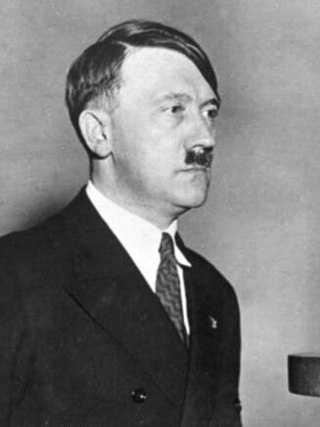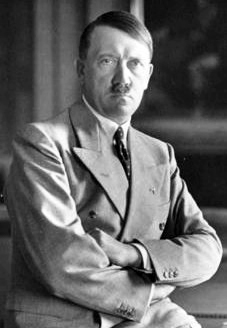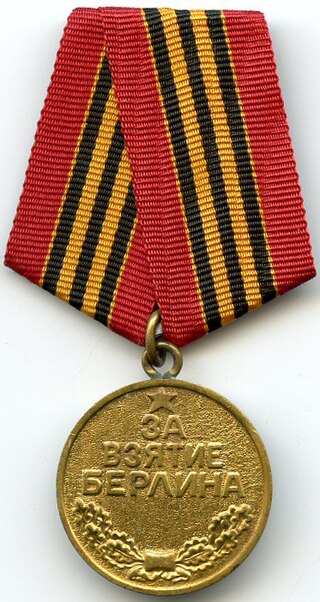
The Bundestag is the German federal parliament. It is the only federal representative body that is directly elected by the German people, comparable to the United States House of Representatives or the House of Commons of the United Kingdom. The Bundestag was established by Title III of the Basic Law for the Federal Republic of Germany in 1949 as one of the legislative bodies of Germany and thus it is the historical successor to the earlier Reichstag.
Reichstag is a German word generally meaning parliament, more directly translated as Diet of the Realm or National Diet, or more loosely as Imperial Diet. It may refer to:

The Reichstag fire was an arson attack on the Reichstag building, home of the German parliament in Berlin, on Monday, 27 February 1933, precisely four weeks after Nazi leader Adolf Hitler was sworn in as Chancellor of Germany. Marinus van der Lubbe, a Dutch council communist, was the apparent culprit; however, Hitler attributed the fire to Communist agitators. He used it as a pretext to claim that Communists were plotting against the German government, and induced President Paul von Hindenburg to issue the Reichstag Fire Decree suspending civil liberties, and pursue a "ruthless confrontation" with the Communists. This made the fire pivotal in the establishment of Nazi Germany.

The Reichstag, a historic legislative government building on Platz der Republik in Berlin, is the seat of the German Bundestag. It is also the meeting place of the Federal Convention, which elects the President of Germany.

The Enabling Act of 1933, officially titled Gesetz zur Behebung der Not von Volk und Reich, was a law that gave the German Cabinet – most importantly, the Chancellor – the powers to make and enforce laws without the involvement of the Reichstag or Weimar President Paul von Hindenburg, leading to the rise of Nazi Germany. Critically, the Enabling Act allowed the Chancellor to bypass the system of checks and balances in the government.

The German Bundesrat is a legislative body that represents the sixteen Länder of Germany at the federal level. The Bundesrat meets at the former Prussian House of Lords in Berlin. Its second seat is located in the former West German capital of Bonn.
A presidium or praesidium is a council of executive officers in some political assemblies that collectively administers its business, either alongside an individual president or in place of one.

Awards and decorations of the Soviet Union are decorations from the former Soviet Union that recognised achievements and personal accomplishments, both military and civilian. Some of the awards, decorations, and orders were discontinued after the dissolution of the Soviet Union, while others are still issued by the Russian Federation as of 2023. Many of the awards were simply reworked in the Russian Federation, such as the transition of Hero of the Soviet Union to Hero of the Russian Federation, and Hero of Socialist Labour to Hero of Labour of the Russian Federation. A wide range of Soviet awards and decorations cover the extensive and diverse period of history from 1917 to 1991.

The Medal "For the Victory Over Germany in the Great Patriotic War 1941–1945" was a military decoration of the Soviet Union established on May 9, 1945, by decree of the Presidium of the Supreme Soviet of the USSR to denote military participation in the victory of the Soviet armed forces over Nazi Germany in the Great Patriotic War.

Parliamentary elections were held in Germany on 12 November 1933. They were the first since the Nazi Party seized complete power with the enactment of the Enabling Act in March. All opposition parties had been banned by the Law Against the Formation of Parties, and voters were presented with a single list containing Nazis and 22 non-party "guests" (Gäste) of the Nazi Party. These "guests", who included the likes of Alfred Hugenberg, still fully supported the regime of Adolf Hitler in any event.

Parliamentary elections were held in Germany on 29 March 1936. They took the form of a single-question referendum, asking voters whether they approved of the military occupation of the Rhineland and a single party list for the new Reichstag composed exclusively of Nazis and nominally independent 'guests' of the party. Like previous votes in the Nazi era, it was rigged, with a claimed turnout of 99% and 98.8% voting in favour. In a publicity stunt, a number of voters were packed aboard the airships Graf Zeppelin and Hindenburg, which flew above the Rhineland as those aboard cast their ballots.

Parliamentary elections were held in Germany on 10 April 1938. They were the final elections to the Reichstag during Nazi rule and took the form of a single-question referendum asking whether voters approved of a single list of Nazi and pro-Nazi guest candidates for the 814-member Reichstag, as well as the recent annexation of Austria. Turnout in the election was officially 99.6% with 99.1% voting 'yes' in Germany and Austria.

The Reichstag of the German Empire was Germany's lower House of Parliament from 1871 to 1918. Within the governmental structure of the Reich, it represented the national and democratic element alongside the federalism of the Bundesrat and the monarchic and bureaucratic element of the executive, embodied in the Reich chancellor. Together with the Bundesrat, the Reichstag had legislative power and shared in decision-making on the Reich budget. It also had certain rights of control over the executive branch and could engage the public through its debates. The emperor had little political power, and over time the position of the Reichstag strengthened with respect to the Bundesrat.

The Reichstag of the Weimar Republic (1919–1933) was the lower house of Germany's parliament; the upper house was the Reichsrat, which represented the states. The Reichstag convened for the first time on 24 June 1920, taking over from the Weimar National Assembly, which had served as an interim parliament following the collapse of the German Empire in November 1918.
The Presidium of the Reichstag was a political office in the German Weimar Republic.
Presidium of the Reichstag (Nazi Germany)

The Reichstag, officially the Greater German Reichstag after 1938, was the national parliament of Nazi Germany from 1933 to 1945. Following the Nazi seizure of power and the enactment of the Enabling Act of 1933, it functioned purely as a rubber stamp for the actions of Adolf Hitler's dictatorship — always by unanimous consent — and as a forum to listen to Hitler's speeches. In this purely ceremonial role, the Reichstag convened only 20 times, the last on 26 April 1942. The President of the Reichstag throughout this period was Hermann Göring.

The Medal "For the Capture of Berlin" was a World War II campaign medal of the Soviet Union established on June 9, 1945 by decree of the Presidium of the Supreme Soviet of the USSR to satisfy the petition of the People's Commissariat for Defense of the Soviet Union. The medal's statute was amended on July 18, 1980 by decree of the Presidium of the Supreme Soviet of the USSR № 2523-X.
Presidium of the Reichstag may refer to:













